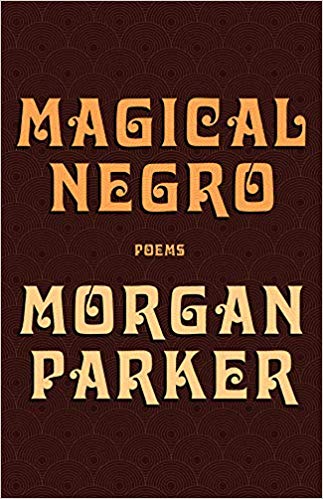Given Morgan Parker’s subject matter in Magical Negro—how the black female body moves through the world, how the black body is seen and othered—it is logical that Parker’s interrogation of physical bodies moving through the world is reflected in attention paid to the black-inked textual signifier of the black body—the word and line of words—moving across the white space of the physical page. Consider the first lines of Parker’s opening poem titled “I Feel Most Colored When I Am Thrown Against A Sharp White Background”:
Or, I feel sharp white.
Or, colored against.
Or, I am thrown. I am against. Or, when white. I sharp. I color.
Here, the circular repetition of the villanelle is sped up and fractured to create a purposeful stutter in a post post-modern remix of language and form. When combined with the short urgent sentences, the dropping of verbs towards the end of the third line both speeds up the suspense and tension of the line and acts as an injection of black African American Vernacular English (AAVE) voice, which structurally takes over the narrative in direct juxtaposition to the “sharp” of whiteness that has inserted itself into the narrative content of the line.
Parker’s interrogation of language is also compellingly evinced through her dictive constructs that surprise and resonate in their meaning. “My body is an argument I did not start,” writes Parker in “And Cold Sunset,” for example, interrogating how the imagination of the white gaze weaponizes blackness as a reason to attack unarmed blackness without provocation—as also memorialized by poets such as Ross Gay, whose “A Small Needful Fact” is a loving ode to Eric Garner.
Yet, within the heaviness of her subject matter—because any authentic work that attempts to engage ethically with blackness will hold a heaviness due to the history and continued presence of anti-black violence—there is a lightness that permeates Parker’s work. Writes Parker in “Nancy Meyers and My Dream of Whiteness”:
you’re right. I want my whole mouth
around your safety
In Parker’s language we see a joy that is at times pleasure—and at other times just plain fun—that is, in turn, a joy to read. Morgan Parker’s effortless versatility with language in Magical Negro is a wondrous and immersive experience. Here is a poet who reminds us of what language can be—innovative and truthful in its rhythmic constructs of meaning.
— Hope Wabuke



 Magical Negro by Morgan Parker (Tin House Books)
Magical Negro by Morgan Parker (Tin House Books)